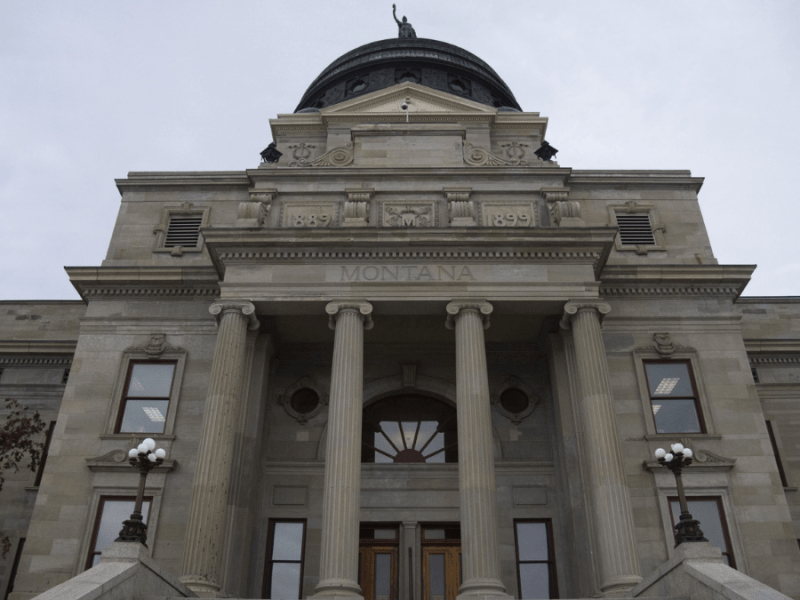A bill before Montana lawmakers has thrust the state into a national debate over the rights of transgender athletes in public schools and, if successful, would likely expose Montana to legal action.
House Bill 112, sponsored by Rep. John Fuller, R-Whitefish, seeks to designate all school sports teams from grade school through college on the basis of the gender an athlete is assigned at birth. Dubbed the “Save Women’s Sports Act,” the measure would specifically bar transgender women from competing on teams or in sports designated for women or girls. Fuller told Montana Free Press that the intent of his legislation is to protect the accomplishments of Title IX, the 1972 federal law that paved the way for women’s equal participation in schools and school programs. Allowing transgender women to participate in women’s sports, Fuller said, is “just wrong.”
“I believe that this will result in the destruction of women’s sports, and I believe it’s a violation of the spirit of Title IX,” he continued.
LGBTQ rights advocates counter that HB 112 is itself a violation of Title IX, and evidence of a larger movement targeting transgender people. Montana is one of several states, including North Dakota, New Hampshire and Tennessee, where legislation restricting the participation of trans athletes has surfaced in 2021. Another of Fuller’s bills, HB 113, which would prohibit doctors from providing minors with hormonal treatments or gender-affirming surgeries, also resembles legislative proposals elsewhere in the country.
Asked by MTFP, Fuller said he had not investigated proposals in other states or solicited input from their sponsors.
But Chase Strangio, deputy director for transgender justice at the American Civil Liberties Union’s national headquarters, told MTFP that Montana’s legislation is clearly linked to a concerted push by national interests. Strangio estimates that roughly 20 bills restricting the rights of transgender people were introduced in state legislatures last year. Action on most of those was cut short by legislative sessions adjourning early due to COVID-19.
Only Idaho’s House Bill 500, the so-called Fairness in Women’s Sports Act, passed, with Republican Gov. Brad Little signing it into law last March. The language of Fuller’s HB 112 closely resembles Idaho’s HB 500, including a supporting citation of an Arizona Republic op-ed co-written by Duke law professor Doriane Lambelet Coleman. The citation prompted Coleman to submit a two-page letter stating that her work had been misused and requesting that Little veto the bill.
The ACLU sued Idaho last summer on behalf of a transgender athlete at Boise State University, resulting in a temporary injunction blocking the law. The conservative nonprofit Alliance Defending Freedom has since appealed the case to the 9th Circuit. Fuller did amend his bill to remove language central to the judge’s decision in Idaho. Still, if HB 112 passes in Montana, Strangio said similar legal action is guaranteed.
“To be clear, we will sue them,” Strangio said. “And these are incredibly costly lawsuits. And I wouldn’t be surprised if the justice department and education department got involved as well.”
A legal review conducted by Montana’s Legislative Services Division also found that HB 112 may present an unconstitutional violation of the Montana Board of Regents’ control over the university system.
Beyond litigation, Strangio added that HB 112 potentially puts federal funding for public schools at risk by requiring them to violate Title IX, and could pull Montana out of contention for future NCAA championship events in light of the NCAA’s inclusionary stance on transgender athletes.
HB 112 and HB 113 have already attracted opposition from a host of human rights and medical associations, as well as from Montana’s business community. The ACLU of Montana announced Thursday that more than 150 businesses across the state have signed a letter opposing both bills.
“We are in the midst of a global health crisis,” said Fritz Lanman, CEO of Missoula-based ClassPass, in a statement. “Our focus should be on enacting laws that protect and support Montanans, including trans and nonbinary youth and other LGBTQ members of our community. I stand with other business leaders in opposition of these discriminatory and harmful bills.”
Other stakeholders from the education system have yet to take a stance for or against Fuller’s proposal. According to its executive director, Mark Beckman, the Montana High School Association is “aware of HB 112 and will continue to monitor this bill through the legislative session.”
HB 112 and 113 have been scheduled for their first hearings in the House Judiciary Committee at 8 a.m. on Jan. 18.
Mara Silvers contributed reporting.
latest stories
Republican lawmakers mount three separate pushes for special sessions
A trio of special session requests from Republican lawmakers each touch on election-year issues, but lawmakers have historically had little success calling themselves into a special session.
What Montana’s candidates for governor have to say about renewing Medicaid expansion
We asked Republican, Democratic and Libertarian candidates if they would support reauthorizing the low-income health care program, which has in the past been the subject of vigorous debates in the Capitol — and is up for renewal again next year. Here’s what they had to say.
‘I hope I can be an example to others:’ Carroll to celebrate Indigenous graduate
During spring commencement, Jaydee Weatherwax — a member of the Blackfeet Tribe from Browning — will become one of the first Native Americans to earn a master’s degree in social work from Carroll College in Helena.




